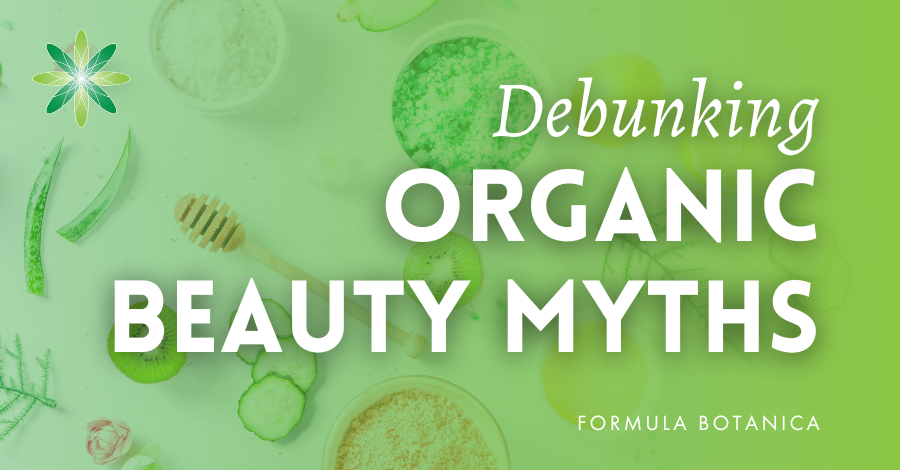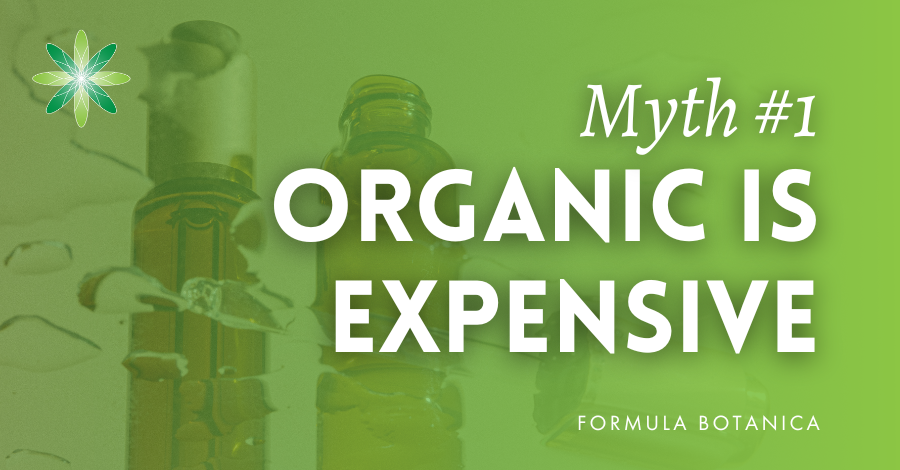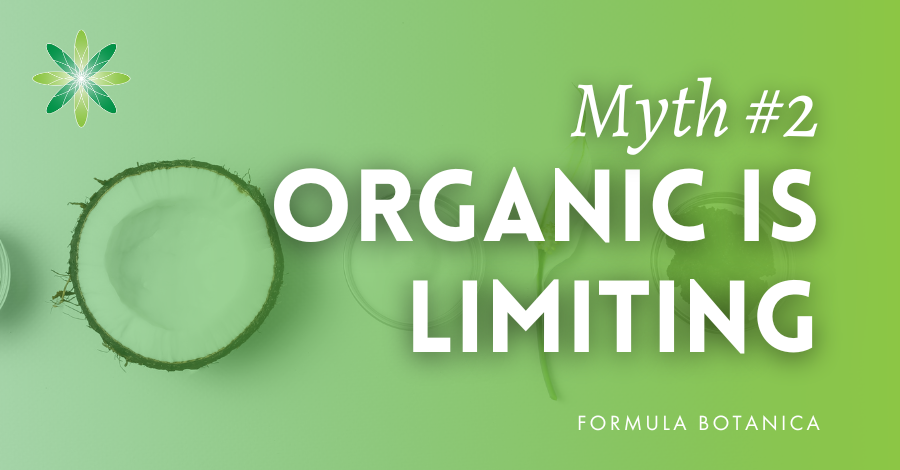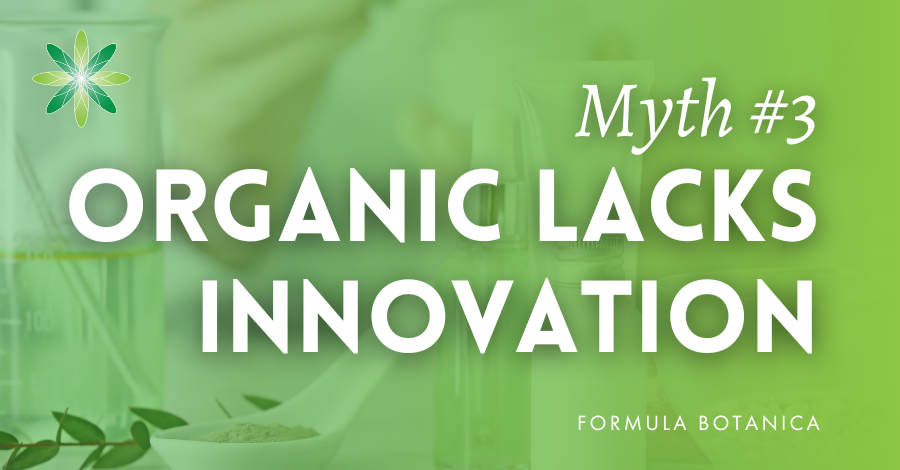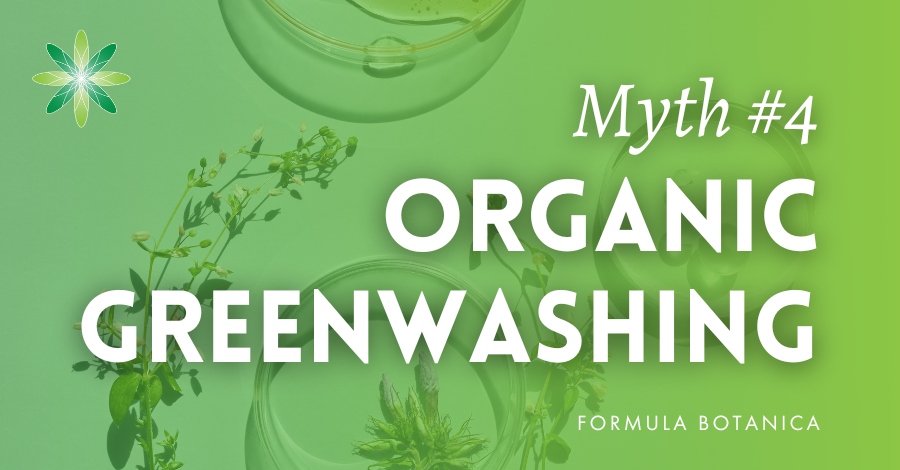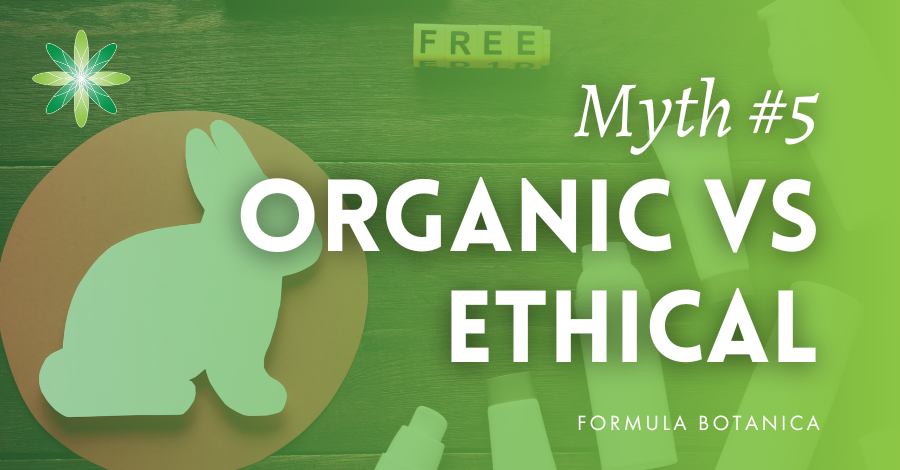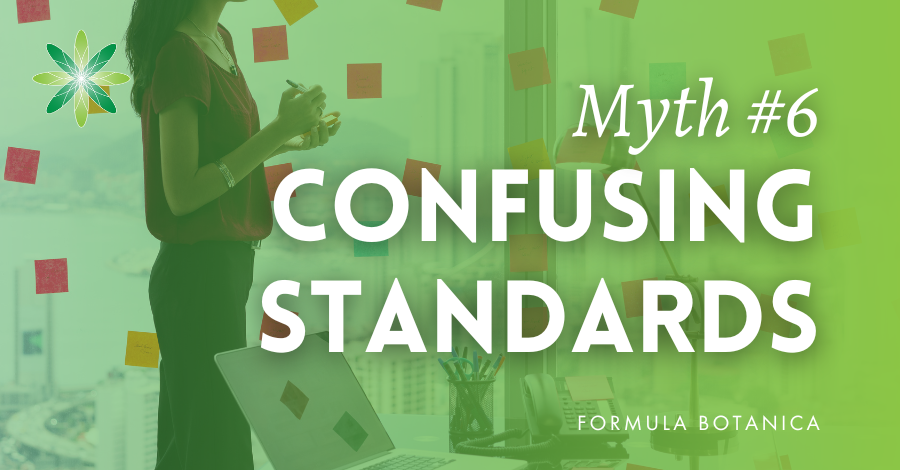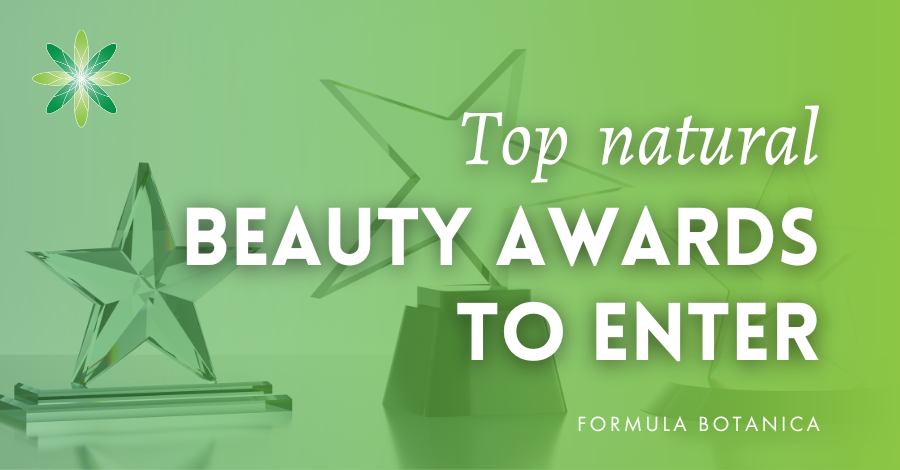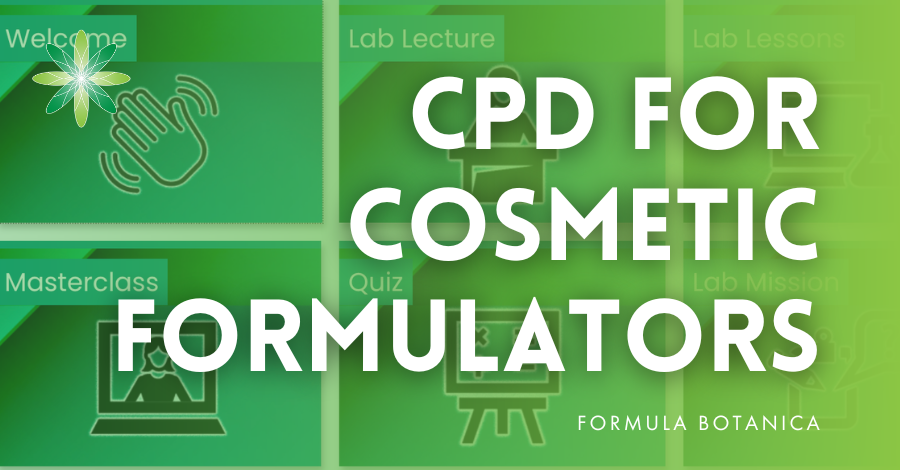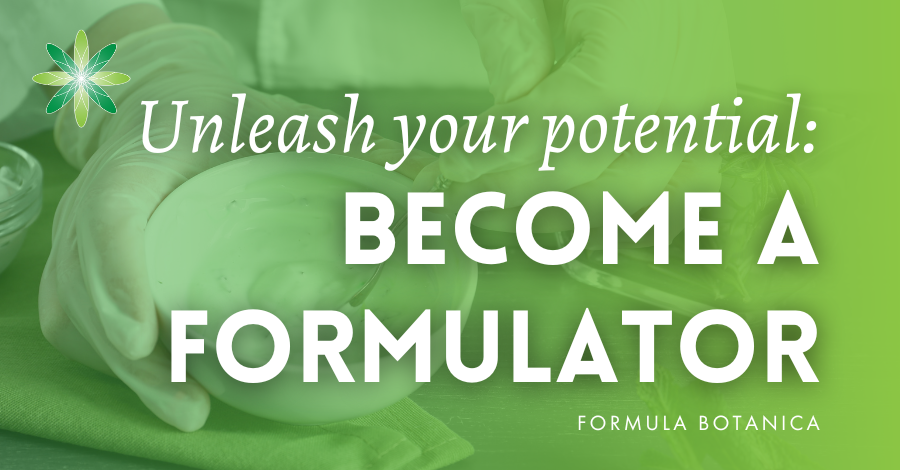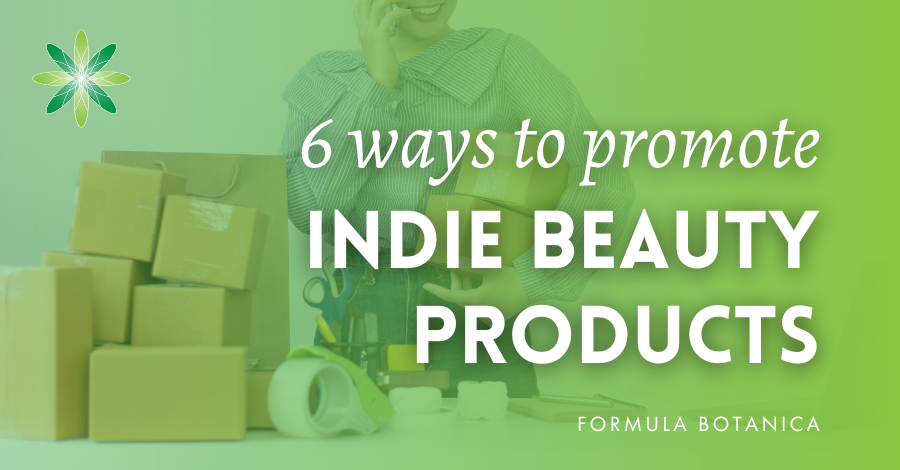When organic skincare emerged in the early 2000s, few took it seriously. But those who did—Karen Behnke of Juice Beauty and Sarah Brown of Pai Skincare among them—led the way to what’s become a multibillion-dollar industry (i). We’re proud to say that we were there too, as pioneers, with courses educating new formulators on the merits and benefits of natural and organic skincare.
Today, those early organic beauty brands are thriving, and Formula Botanica is now known as the leading online organic cosmetic formulation school. In our podcast interview with Sarah, she notes that when her brand launched in 2007, there wasn’t a word for what we now call “sustainable”, but that “organic absolutely embodies it”.
Even then, organic was about more than farming practices that are non-GMO and free of artificial pesticides. However, many people don’t realise all that’s involved in organic certification, and misunderstandings about organic skincare persist. Here, we dig into the most common and persistent myths and misconceptions about organic cosmetics.
Myth 1: Organic skincare is expensive compared to the mainstream
There’s no doubt that organic certification is expensive. This cost, plus the generally higher cost of natural ingredients, is understandably reflected in the price of organic cosmetics. As such, it’s easy to draw the conclusion that organic skincare must be more expensive than conventional products. This is sometimes true, but the opposite can equally be said.
The price of any product is set according to several factors, with ingredients being just one. Often, it is branding that determines the price of a product; for example, a high-end luxury brand has an image to uphold, and this could push the price of its products up regardless of what is in the bottle. Likewise, you could be paying for expensive marketing just as easily as organic-certified ingredients. It’s all about the positioning of a brand, so organic products are not automatically and always more expensive.
Myth 2: Organic ingredients are limited, making it difficult to formulate organic skincare
There may be slightly fewer ingredient options to choose from when you formulate to an organic standard, but the demand for organic cosmetics just keeps growing (ii), and this propels the industry to produce more certified organic raw materials. Judging by the sheer number of successful organic brands on the market, we can see that there is enough supply and variety of suitable ingredients to create an endless array of gorgeous, differentiated products.
Myth 3: Organic skincare lacks innovation and high-performance efficacy
In fact, it might be more accurate to say that organic skincare pushes innovation with its unwavering demand for exceptional alternatives that fit into the organic ethos. In addition, many organic brands have scientific proof of the efficacy of their organic products as high-performance skincare.
When Karen at Juice Beauty launched her brand in 2005, she set out to meet or exceed the efficacy of conventional skincare. To prove that her products worked, she used the same labs as conventional brands. Juice Beauty’s Green Apple Age Defy Serum was tested, for instance, against both a leading natural and a leading conventional antioxidant serum, and the Juice Beauty product was found to be nearly three times more effective.
For more background on the issue of the efficacy of organic cosmetics, listen to the full story with Karen on our Green Beauty Conversations Podcast:
Episode 35: Can organic skincare ever be high-performance?
Furthermore, organic ingredients are inherently of high quality, which elevates the finished products. Sarah at Pai Skincare explains that meticulous attention is given to every organic ingredient, from how it’s grown and extracted to how it’s handled at every stage. She says that the concentration of properties in organic skincare, with its inherent abundance of skin-beneficial properties such as antioxidants and fatty acids, makes organic “poetic”. Undoubtedly, with beautiful organic ingredients, you can create products of unrivalled quality.
Myth 4: Some organic skincare brands make misleading claims and engage in greenwashing
If this were true, these brands would not be certified for long. Truthfulness and transparency in all marketing claims and labelling are required when a product is certified organic (iii). In any case, organic certification bodies audit their accredited brands regularly. The confusion comes when a brand or product is not certified, since there are currently no laws for the use of the term organic when it comes to beauty products (iv). Some brands are more transparent and say that while some of their ingredients are organic, they and their products do not have organic-certified status.
Greenwashing – that is, to give the appearance of being natural or organic by using clever marketing language as opposed to truly being green – goes against everything that a certified organic beauty brand has worked towards. These brands chose to follow the costly and demanding process of becoming certified because they have nothing to hide and they’re proud of it. They don’t need to rely on greenwashing, and they call for the elimination of this practice.
Pai Skincare gained organic certification with the UK-based Soil Association, which was the first organic standard for cosmetics in 2002 (v) and is now part of the Cosmos Standard. Pai has added vegan and cruelty-free certifications since then, but organic status is a gold standard because, in Sarah’s view, consumers recognise its value immediately as it is based on unequivocal criteria.
Sarah notes that terms like “clean” and “non-toxic” have helped fuel greenwashing because they are self-referring and not based on standards that are verified by trusted, independent third parties, and there are experts who agree (vi). The organic standard is a clear set of guidelines and a pledge to deliver on specific, well-defined promises of organic beauty.
Now, just to add to the plethora of standards facing us when we shop for cosmetics, we also have those created by leading retailers who are defining their own criteria for clean beauty when deciding which brands to stock. The Credo Clean Standard (vii) is one of the most respected, and Clean at Sephora (viii) is another. You can find out more about Credo’s approach in our podcast interview with Mia Davis, the VP of Sustainability and Impact at Credo Beauty, which is the largest clean beauty retailer in the US.
But, in general, anyone can use terms like clean and non-toxic. Trusted third-party certification is the only way consumers can know if their skincare products are truly organic.
Myth 5: Some organic ingredients may be unsustainable or sourced using unethical practices
While this may be said of some natural skincare ingredients (there is a need for sustainably sourced palm oil and ethically mined mica), when an ingredient is part of a certified organic product, it becomes held to a higher standard. In the cases of palm oil or palm-derived ingredients for which an organic option is not available, a brand must be able to trace these back to a sustainable and ethical source (ix).
Furthermore, it’s not enough for an organic ingredient to be natural, non-GMO, and grown without synthetic pesticides, herbicides, and fertilisers. Nearly every standard also requires the ethical treatment of workers, respect for animal welfare and biodiversity, environmental responsibility, sustainability, green chemistry, and fair-trade practices. These principles apply to the individual ingredients, the finished product, its packaging, marketing, and labelling. You can find out about other certification bodies and accreditation schemes in our post:
Sarah at Pai puts it best: “What I think people still don’t understand are the broad ethical dimensions of organic certification. They think about it as how the ingredient is grown. It is, but that is one tiny part. It also embraces how those farmers are treated and how that farmer’s community is looked after. It is about making sure that we’re minimising the impact on their environment, not draining their soils, not contaminating their local water supplies, not using endangered plants, and the list goes on and on”.
Myth 6: Organic certification standards can vary, leading to confusion and inconsistency
There are many – possibly too many – sustainable certification schemes for brands to choose from: carbon neutral, climate neutral, biodynamic, and more. But there are just a few organic certifying bodies for cosmetics – Cosmos, NaTrue and EcoCert – and they’re very much aligned when it comes to their ethos and requirements. The prime directive of every certified organic standard is to be respectful and responsible at every step, from field to face.
The original entrants into the world of organic beauty knew they were on to something. Fast forward 20 or so years, and the burgeoning growth in this market makes organic certification more highly valued than ever – whether you’re a consumer, a formulator, or both. If you’re considering organic certification for your brand, our Diploma in Beauty Brand Business Management covers this in detail – and every other aspect of growing a beauty brand from scratch.
Further Reading & References
(i), (ii) Business Wire, Jan. 23, 2023: $14+ Billion Worldwide Organic Skincare Industry to 2031 – Increasing Prevalence of Skin Issues Is Expected to Propel Growth.
(iii) NaTrue Label Criteria: Requirements to Be Met by Natural and Organic Cosmetics
(iv) Soil Association – Why certify?
(v) Soil Association – Beauty & Wellbeing
(vi) N. Stechyson, CBC, Aug 4, 2022: What’s a ‘Clean’ Beauty Product? No One Can Say for Sure.
(vii) The Credo Clean Standard.
(viii) Forbes, Aug 17, 2020: How Sephora Sets the Standard for Bringing Clean, Safer Products to the Marketplace.
(ix) Soil Association – FAQ: Why Does Cosmos Permit the Use of Certified Sustainable Palm Oil?
Leave us a comment

Shauna is a former freelance writer at Formula Botanica. A former aesthetician, Shauna is also an active formulator and perfumer, and a member of the Formula Botanica community.

